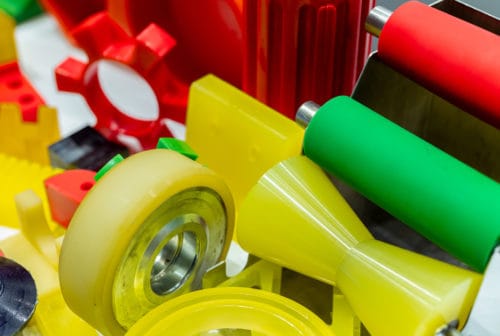Engineering Plastics to Use in Precision Machined Parts
Comments Off on Engineering Plastics to Use in Precision Machined PartsPrecision machining is a controlled manufacturing process used to manufacture high-precision parts out of various materials, such as plastics. Precision machined plastic parts are found in nearly every industry, valued for their lightweight and versatile properties. Here we’ll discuss the most common materials used in precision plastic machining and their respective benefits.
Popular Plastics for Precision Machined Parts
Precision machining, specifically computer numerical control (CNC) machining, is compatible with a wide range of plastics. CNC machining is an automated, computer-controlled manufacturing process. Here is an overview of the best types of plastics to use for precision machining.
Acetal
Acetal has a slippery surface and impressive wear resistance. It is common in valve components, bearings, and gears.
Nylon
Nylon is a type of low-friction engineering thermoplastic with excellent chemical resistance, abrasion resistance, and high impact strength.
Polyetheretherketone (PEEK)
PEEK is a lightweight, durable thermoplastic valued for its unique combination of mechanical properties. It is resistant to wear, liquids, fatigue, creep, chemicals, and high temperatures up to 260 °C.
Polycarbonate (PC)
PC is a tough, lightweight plastic that can withstand high heat and has good electrical insulation properties. Polycarbonate sub-types include:
- Abrasion-resistant PC
- Glass-filled PC
- Static dissipative PC
- Bullet-resistant PC
Polytetrafluoroethylene (PTFE)
PTFE—also known as Teflon®—is a high-performance polymer with impressive physical and mechanical properties, including resistance to chemicals, water, UV, light, high temperatures, moisture, fatigue, and weathering. PTFE is also popular for its low coefficient of friction and corrosion resistance.
Polyphenylene Sulfide (PPS)
PPS is a high-temperature engineering thermoplastic that can withstand up to 200 °C for extended periods of time. It is the best material choice for complex parts with tight tolerances because of its dimensional stability under temperature and humidity fluctuations.
Benefits of High-Precision Machined Plastic Parts
Each plastic type stands out for its distinct mechanical and physical properties. They each have applications for which they are best suited when precision manufacturing parts. Below are the benefits of these commonly used plastics.
Acetal
- Wear resistance
- Good stiffness
- Dimensional stability
- Heat resistance
- Chemical resistance
Nylon
- High impact strength
- Chemical resistance
- Abrasion resistance
PEEK
- High resistance to chemicals, wear, fatigue, and high temperatures
- Lightweight
- Recyclable
- Biocompatible
- Insoluble in most solvents
PC
- Lightweight
- Clarity
- Tough
- Good electrical insulation
- Transparency; excellent light transmissivity
PTFE
- Anti-adhesive
- Chemical resistance
- High-temperature resistance
- Light and UV resistance
- Wear resistance
- Fatigue resistance
- Water resistance
- Creep resistance
PPS
- High-temperature resistance
- Good electrical insulation
- Dimensional stability
- Chemical resistance
- High tensile strength
High-Precision Machining at National Plastics and Seals
At National Plastics and Seals, we pride ourselves on our in-depth expertise with polymeric materials and high-precision machining. We work with a wide range of plastics, including nylon, PTFE, PEEK, polycarbonate, PPS, and acetal. We are uniquely equipped to partner with you on material selection based on your specifications. Contact us to discuss your project, or request more information to learn more about our products and services.


